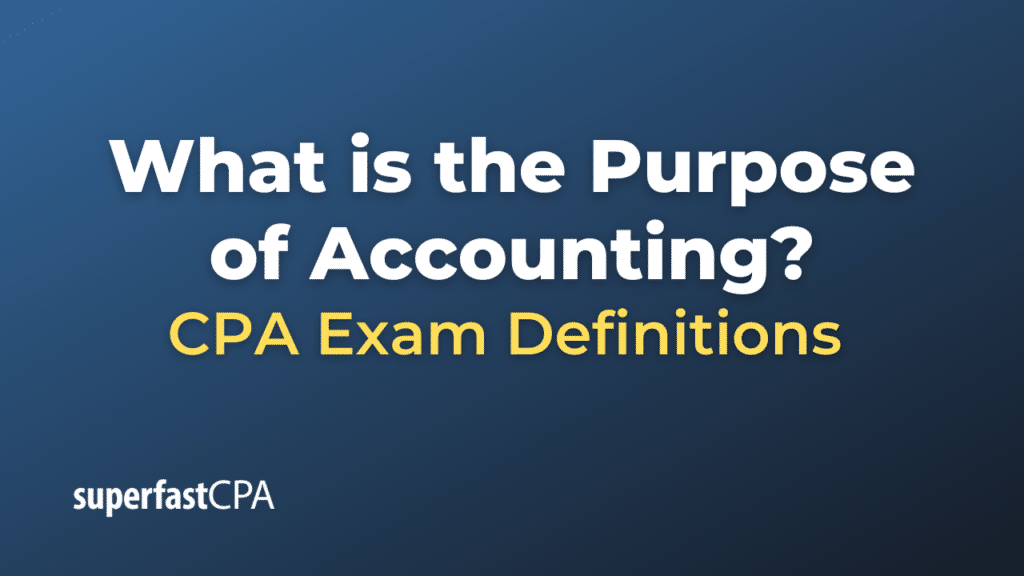Purpose of Accounting
Accounting serves several important purposes in the operation of businesses, government entities, and non-profit organizations. Here are some key purposes:
- Record Transactions: Accounting provides a systematic way to record a company’s financial transactions in a consistent and accurate manner.
- Report Financial Position: Accounting systems help in the preparation of important financial statements like the balance sheet, income statement, and statement of cash flows. These statements provide information about the company’s financial position, performance, and changes in financial position over a certain period.
- Management Decision Making: Managers use financial reports to make informed business decisions. This could be anything from budgeting for the next fiscal year to deciding whether to expand into a new market.
- Regulatory Compliance: Businesses are required to follow certain laws and regulations regarding financial reporting. Accounting helps ensure that a business is in compliance with these regulations.
- Facilitate Tax Preparation: Accurate accounting is essential for preparing tax returns and supporting documentation, as well as for planning to minimize tax liabilities within the law.
- Investor and Lender Analysis: Investors and lenders use financial statements to evaluate the financial health and profitability of a business. They use this information to decide whether to invest or lend to the business.
- Fraud Detection and Prevention: An effective accounting system can help to detect and prevent fraud by monitoring for irregular transactions and discrepancies.
- Performance Evaluation : Accounting helps in assessing the performance of different departments, product lines, or sales regions within a company. This is crucial for understanding what’s working and what needs improvement.
In short, the main purpose of accounting is to help stakeholders make better decisions by providing them with financial information. It’s often referred to as “the language of business” because it provides a way to communicate a business’s financial health to external parties as well as to the business’s own managers.
Example of the Purpose of Accounting
Let’s consider an example using a fictional company, “Garden Delights,” which is a small business selling garden supplies.
- Record Transactions: Garden Delights makes numerous financial transactions every day, including buying inventory from suppliers, selling products to customers, paying salaries to employees, and more. An accounting system allows the company to accurately record these transactions in their books.
- Report Financial Position : At the end of the fiscal year, Garden Delights uses its accounting system to prepare financial statements. These statements show their revenues, expenses, assets, liabilities, and owner’s equity, providing a clear picture of the company’s financial health.
- Management Decision Making: Based on the financial reports, the management at Garden Delights may decide to discontinue a particular product line that is not profitable or invest more in advertising a product that has high sales.
- Regulatory Compliance : The accounting system of Garden Delights ensures that all transactions are recorded and reported as per the local regulations and tax laws. This helps in avoiding any legal complications and penalties.
- Facilitate Tax Preparation: The company’s accountant uses the financial records to prepare and file the company’s tax returns accurately and on time.
- Investor and Lender Analysis: If Garden Delights wants to take a loan for expansion, potential lenders will look at the company’s financial statements to assess its ability to repay the loan.
- Fraud Detection and Prevention: The accounting system can help Garden Delights detect any irregularities or discrepancies in the financial transactions, which could indicate fraud or error.
- Performance Evaluation : The management uses the accounting information to evaluate the performance of different product lines. For instance, they find that the organic fertilizer products are performing well, but the sales of garden tools are below expectations. This information can help them in strategizing for the next business period.
So, in this example, you can see how accounting plays an essential role in various aspects of Garden Delights’ business operations. It not only helps in recording the financial transactions but also provides valuable information for decision-making, regulatory compliance, tax preparation, and performance evaluation.













